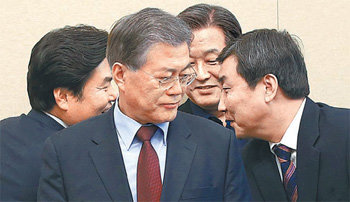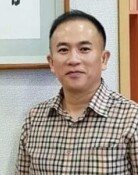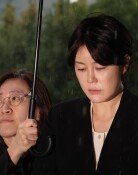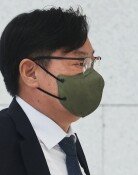Talks over constituencies falter with 8 days before candidate registration
Talks over constituencies falter with 8 days before candidate registration
Posted December. 07, 2015 08:19,

The April 2016 general elections are fast approaching, but related laws have yet to be defined. Registration of preliminary candidates for the general elections will start on December 15. Rival parties, however, have failed to narrow differences over revision of the public officials election act meant to change criteria for defining the constituencies for the general elections. The ruling and opposition parties discussed criteria for defining constituencies again on Sunday, not hammering out any differences before ending talks. They have apparently gone way too far in acts of negligence.
Ruling Saenuri Party Chairman Kim Moon-sung, main opposition New Politics Alliance for Democracy Chairman Moon Jae-in, Saenuri floor leader Won Yoo-cheol, and NPAD floor leader Lee Jong-geol, and rival party secretaries on the parliamentary special committee on political reform held a "3+3" meeting on the day, but in vain. They met in three days after their first gathering through arbitration by National Assembly Speaker Chung Eui-hwa on last Thursday, but they only confirmed their differences and ended the meeting just 23 minutes after the opening.
The rival parties share the consensus that the National Assembly will maintain the total number of seats at the current level (300 seats), increase the number of local constituency seats, but reduce that of the proportional representation seats. They concur that the National Assembly should increase the number of local constituency seats from the current 246 to 253, but cut that of proportional representation seats from the current 54 to 47. This move aims to minimize the number of seats, which are expected to merge in rural areas, as the Constitutional Court had ruled that the gap in population of each constituency should be reduced to less than two to one.
But the key question is whether to introduce a new election system or not. The NPAD is asking the introduction of a linked proportional representation system to allocate the number of seats depending on the number of seats that each party garners, in return for accepting Saenuri`s demand to reduce proportional representation seats. The opposition party is demanding that the National Assembly introduce a regional proportional representation system, which would divide the nation into several electoral regions, or a balanced seat system to guarantee half of the seats at stake according to the ratios of votes that parties earn. It is thus suggesting that the National Assembly devise a measure to boost the proportionality to ensure that votes will be reflected in the number of parliamentary seats.
(At the meeting on December 3) the Saenuri Party said only the number of proportional seats can be reduced only when proportionality is assured, NPAD floor leader Lee said after the meeting. (At Sundays meeting), the ruling party failed to display any sincerity.
It is not logical to discuss the regional proportional representation system or the linked seat system (balanced seat system), which was proposed by political reform committee chairman Lee Byung-seok, under the current situation wherein power structure (presidential system) remains unchanged," Saenuri Chairman Kim said, indicating any Organization for Economic Development and Cooperation country has not introduced the two systems. He also means that his party cannot accept the opposition`s proposal because under the system, the Saenuri Party could lose its majority in parliament due to a reduction in the number of proportional seats.
Leaderships of the rival parties ended their meeting even without fixing the date for a next meeting. Hence, chances are high that the public officials` election act will not be amended by December 14, the eve of the date for preliminary candidate registration. Critics say that political newcomers will inevitably experience a chaotic situation, in which they have to stage election campaigns even without knowing their constituencies.
sungho@donga.com
Headline News
- N. Korea redefines S. Korea as ‘hostile state’ in revised constitution
- Samsung develops graphic DRAM with industry-leading capacity and speed
- Three questions allegedly leaked via text message during Yonsei Univ. essay test
- China to inject 340 trillion won in loans to support real estate sector
- Dodgers beat Mets to take 2-1 lead in NLCS







